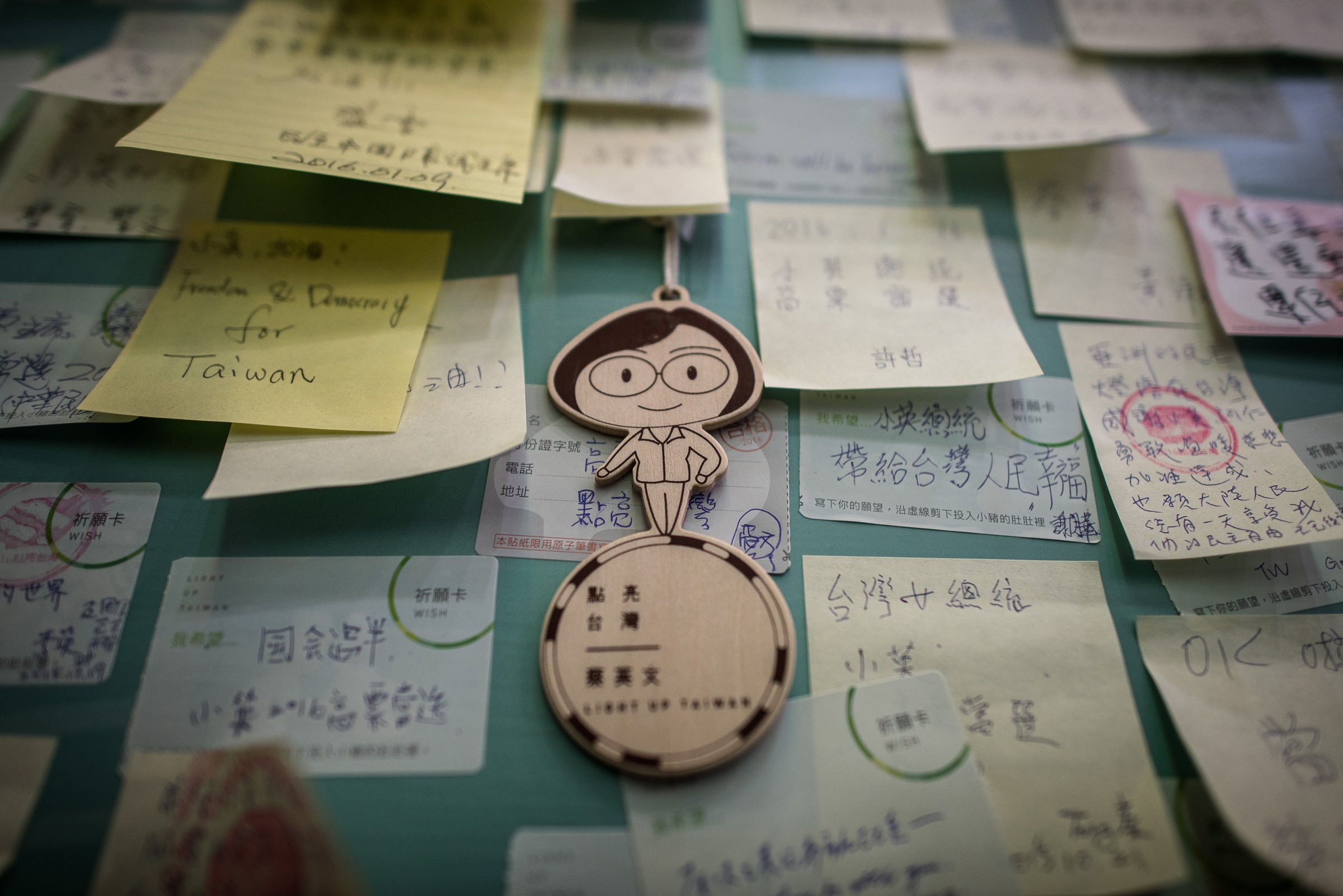
Were it not for the warbling of Bob Marley playing in the background, you could’ve heard a pin drop. Between sips of Belgian craft lager, Harmony Chen, a mainland Chinese exchange student studying in Taiwan, had just given a caustic assessment of the island’s cherished democracy before a group of his Taiwanese peers.
“It’s a joke,” said the 24-year-old film-studies student from China’s eastern Zhejiang province. “Politicians in Taiwan always lie to the people but the people believe them.”
Taiwan choses a new leader on Saturday in elections that constitute a profound anomaly in the Chinese-speaking world: the peaceful transfer of power through a popular vote. The incumbent Nationalist Party (Kuomintang, or KMT) is hemorrhaging support, largely owing to the island’s anemic economy, and so Tsai Ing-wen, a U.K.- and U.S-educated scientist, and the leader of the Beijing-skeptic Democratic Progressive Party (DPP), is almost certain to become Taiwan’s first female President.
The looming vote has elicited contrasting reactions from across Greater China. Hundreds of “democracy tourists” have showed up from the semiautonomous Chinese satellite of Hong Kong, flocking here to enviously observe the truly free elections that they are denied, having their own leader chosen by a small electoral college. But while a smattering of curious mainlanders have followed suit, total visitor numbers from China have halved in the run-up to the polls, Reuters reports, with mainland tourists apparently shirking the highly politicized atmosphere.
And then there are an estimated 10,000 students from China already living in Taiwan, who have little option other than to occupy an uneasy perch in the democratic viewing gallery. Having been raised in a state ruled solely by the Chinese Communist Party (CCP), many express open disdain for what they see as the disorder, sniping and divisiveness of the democratic process.
“I don’t care about politics, I just care whether my life is better or not,” says Wang Tiancheng, a chemical-engineering student from Heilongjiang province studying at Taichung’s Chung Hsing University. “The problem in Taiwan is politicians say things for show but they don’t do anything for the people.”
Disenchantment with politics may be natural for young adults raised in an autocracy like the People’s Republic, where the party claims the right to rule in return for delivering continuous improvements to the standard of living — a near-Faustian bargain that it may not always be able to honor. The severe punishments meted out to dissidents and dissenters also hardly encourage an interest in politics or human rights.
Such youthful apathy chaffs against the legacy of Tiananmen Square — where a brutally crushed democracy demonstration in 1989 saw scores of students give their lives in the name of freedom. It is likewise difficult to reconcile with the more recent struggles of students in Hong Kong and Taiwan, where civil-disobedience movements gained world-wide respect in 2014 for peacefully agitating for greater transparency and democratic reform.
But according to Professor Lin Chong-pin, of Taiwan’s Tamkang University’s Graduate Institute of International Affairs and Strategic Studies, the key difference between these communities of students lies with the freewheeling media environments that both Hong Kong and Taiwan enjoy outside China’s Great Firewall.
“You must look at how effectively Beijing has controlled its media for decades,” he says, “therefore people in mainland China may not be happy with their government, but they maintain their pan-Chinese mentality.”
In today’s China, that ultimately means blind deference to the CCP. “Taiwan has democracy and gets worse and worse; China does not have democracy but keeps getting stronger,” says Chen. Wang concurs: “Maybe Taiwan has more freedom, but I don’t care because what is freedom without money?”
Hard cash is also high in the priorities of Taiwan’s 23 million citizens, who have been hit by hard times that even burgeoning trade ties with China, the world’s second largest economy, have failed to remedy. China still claims Taiwan as a “renegade province” to be reclaimed by force if necessary. The DPP has historically favored formal independence, a status that would entail a swift military reprisal from China. The DPP has since softened its stance on independence, but it still wants to shift Taiwan’s focus from China by diversifying its economy to include trade with Southeast, South and East Asia.
Some fear even this small step may set back cross-strait relations, with possible repercussions for tourists and students, who now enjoy relatively unfettered travel back and forth. According to Lai Chia-ling, an anthropology student at Taiwan National University, who helps around 30 mainland Chinese students acclimatize through its Mouse Lab program, “some visiting students are really nervous that a DPP victory means that they will no longer be able to stay.”
Nevertheless, and despite the venom hurled at the DPP by Beijing, many mainland Chinese students are ironically rooting for the pro-independence party. “Many Chinese students think the DPP is like the CCP, because the CCP beat the KMT 50 years ago and the DPP are beating them now,” says Chen, referring to KMT chief Generalissimo Chiang Kai-shek’s defeat by Mao Zedong’s communists in China’s civil war in 1949. “The DPP claims they act on behalf of the people and many people believe them.”
More Must-Reads from TIME
- Donald Trump Is TIME's 2024 Person of the Year
- Why We Chose Trump as Person of the Year
- Is Intermittent Fasting Good or Bad for You?
- The 100 Must-Read Books of 2024
- The 20 Best Christmas TV Episodes
- Column: If Optimism Feels Ridiculous Now, Try Hope
- The Future of Climate Action Is Trade Policy
- Merle Bombardieri Is Helping People Make the Baby Decision
Write to Charlie Campbell / Taipei at charlie.campbell@time.com